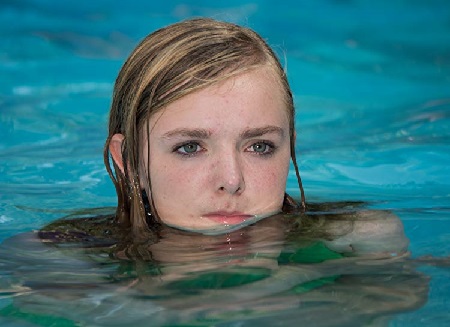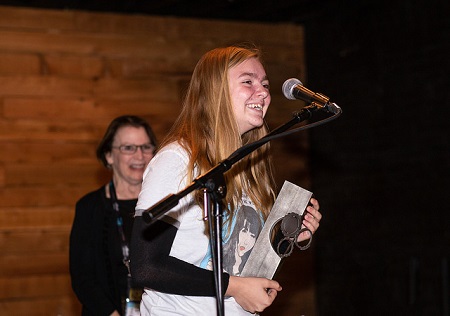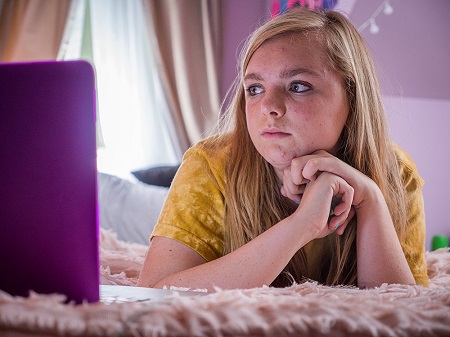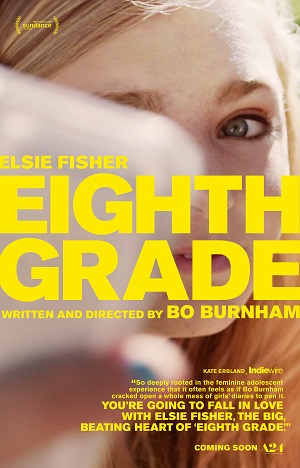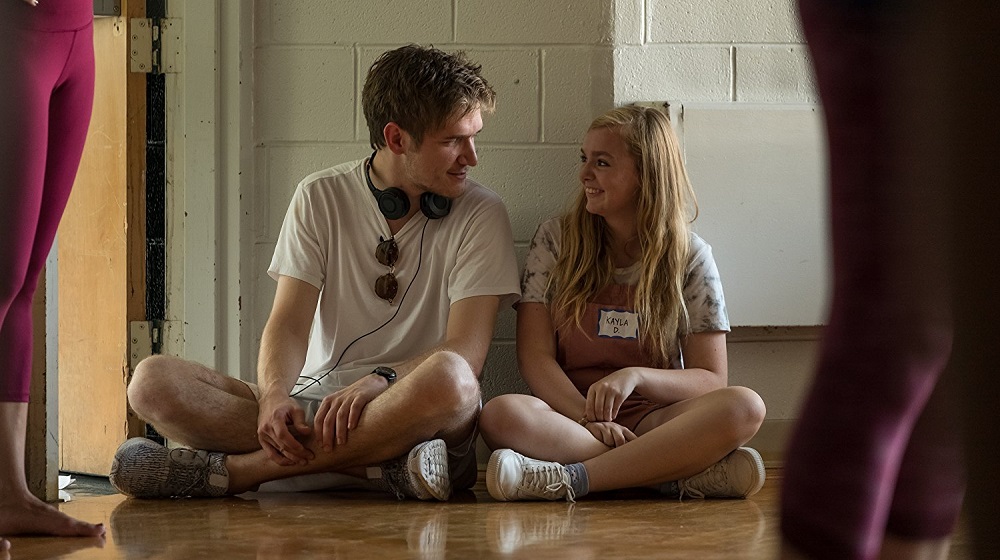
“Eighth Grade” – Interview with Bo Burnham and Elsie Fisher
by Sara Michelle Fetters - July 26th, 2018 - Film Festivals Interviews
a SIFF 2018 interview
“A story about all of us”
Chatting Eighth Grade with Writer/Director Bo Burnham and Actress Elsie Fisher
Writer/director Bo Burnham’s Eighth Grade is sensational. The story of a young middle school student, Kayla (Elsie Fisher), the movie is a coming of age marvel that held me continually spellbound as its authentically naturalistic narrative played itself out to conclusion. As I wrote in my theatrical review, “This is a movie that refuses to shy away from some fairly dark realities yet at the same time doesn’t dwell on them in ways that feel exploitive or supercilious. Instead, it’s the bigger picture that matters, Kayla’s journey so acutely haunting it’s likely I’ll be thinking about it in intense, fascinated detail for some time to come.”
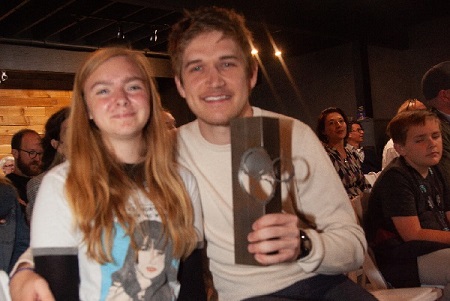
Elsie Fisher and Bo Burnham
SIFF2018 | Golden Space Needle Awards | June 10, 2018
PHOTO: Clark Labelson
Apparently I’m not alone in that assessment. Not only did Burnham’s debut play like gangbusters back in January when it premiered at Sundance, this past June it also took home Golden Space Needle audience awards for Best Picture and Best Actress when it played as part of the Seattle International Film Festival. It’s exhilarating, timeless stuff, the director’s script achieving a level of empathetic grace that in many ways is altogether stunning.
The day after taking home both prizes I had the good fortune to head over to Seattle Center and chat with both Burnham and Fisher about Eighth Grade. Here are some of the highlights from our 20 minute conversation:
Sara Michelle Fetters: So. I guess nothing exciting happened yesterday? Nothing important?
Bo Burnham: [laughs] No. Nothing at all.
Elsie Fisher: Yeah. [laughs] It was a pretty quiet day.
Sara Michelle Fetters: Seriously. Congratulations to both of you. Not just for the film winning, but for you taking home that Best Actress prize as well, Elsie.
Elsie Fisher: Thank you. I was pretty shocked. But I’m really happy for Bo. I love this movie so much.
Bo Burnham: Oh, you’re just saying that because you have to be nice to me until the end of the press tour. [laughs]
Honestly, though, thank you for saying that. I love the movie, too, and you’re performance is a major reason why.
Sara Michelle Fetters: So. As to that film. How many 13-year-old girls did you steal diaries from in order to write such an honest, emotionally affecting screenplay?
Bo Burnham: [laughs] That’s the question, right? I’ll never tell.
Honestly, the really impulse was that I wanted to tell a current story. I didn’t want to tell a nostalgic story. I’m was only consulting 13-year-old girls in 2017. The good thing about these girls in 2017 is they’re posting everything about themselves online, so you actually don’t need to sneak into their homes and read their diaries. They’re telling you everything about themselves on YouTube, Instagram, Facebook; you name it. Writing this, it was a lot of just watching videos of girls online giving advice on how to be confident, how to be cool, how to make friends, how to dress; all of that stuff. It was just getting in their head and trying to live it in as much as I could.
Sara Michelle Fetters: It seems like this movie very easily could have just been a diatribe about social media and about the way that young people right now are living more online and not having any real life social interactions. Instead, this ends up being a very empathetic movie about finding your voice.
Bo Burnham: I hope so. I don’t know. There’s been a lot of movies about the minefield of social media. Anyone that’s close enough to the internet, it’s pretty obvious that it’s there. The closer you get to the internet, the more fuzzy your feelings get about it. The hope is just to treat the world and the internet on its terms and to not impose this adult judgment on it.
In regards to Kayla, she doesn’t hate the internet. She loves the internet. We want to see everything through her eyes. We want to experience the same things she does. Kayla’s story, it’s not a finger-wagging, ivory-towered TED Talk about the internet. There more to her story than that. There’s more to life than just what happens on the internet.
Sara Michelle Fetters: Elsie, what’s all of this been like for you? I think I have this right, but you were either in eighth grade or just finishing up eighth grade when you started making this movie.
Elsie Fisher: It was really cool personally, because through a lot of my middle school, and just my school experiences in general, I felt like a really weird person. I’m like, no one else is feeling what I’m feeling. Then I read this script and I’m suddenly like, everyone is feeling what I’m feeling. That was very cool for me. It’s insane. I can’t even describe it. It’s very cool.
Bo Burnham: We actually shot it the summer after you finished eighth grade. Crazy, right?
Elsie Fisher: Yeah. Like, I finished school and jumped right into this. So crazy.
Sara Michelle Fetters: Was it hard to have to go back and mine some of those emotions? Especially as a teen girl going through a lot of these things while also dealing with your own version of stardom. I mean, thanks to Despicable Me, at a very young age, even though people maybe didn’t know what you looked like, you were still famous.
Elsie Fisher: I guess so. A little bit, maybe. I’ve always just tried to be me, so I’m not sure I was honestly all that famous.
But it was hard at times. I do think in general I was already kind of in the mindset of Kayla. It was just about continuing to feel that. I didn’t feel the need to look at something and get myself ready, I guess. I was already kind of there.
Bo Burnham: I bet you would have loved to get out of the head space at times.
Elsie Fisher: At times. Yeah. But not all the time. Kayla’s pretty cool.
Bo Burnham: But I do think it’s similar to like what I used to do when I did standup. A lot of the feelings I was going through it’s like, okay, just put them in the work. That would sometimes make it easier. I imagine that was similar to what you did.
Elsie Fisher: Definitely. Yeah.
Bo Burnham: But I also wanted to make Kayla universal. I think we all struggle with what Kayla’s going through in the movie. We’ve all had those feelings. Do you know what I mean?
Elsie Fisher: Yes. I do. I wasn’t the only girl, the only person, at school dealing with these things I’m sure. They’re hard for most people to talk about.
Bo Burnham: It actually becomes much more therapeutic when you can address those things in a work situation. Me with standup. You in the film.
Elsie Fisher: I like that. Therapeutic. That’s exactly what it was. It definitely felt like that for me. Doing the movie.
Sara Michelle Fetters: It is such a rare thing, what this movie actually ends up being about. You could have made a film about bullying. You could have made one about cliques. You could have made one about so many things, almost all of them we’ve at one point or another likely seen before.
Bo Burnham: I could have. True. But that’s been done, don’t you think?
Sara Michelle Fetters: I do. But this movie. This movie is about a young girl dealing with her own perceived, and in some ways actual, invisibility. This isn’t something you see a lot of teenage stories tackling, at least not with such insight and nuance.
Bo Burnham: Yeah. I think that is the currency of the current moment: visibility. The sort of “mean girls” in the movie are actually just ignoring Kayla. They’re not really doing anything. When she’s walking into the pool party, it’s not like everyone is turning and pointing at her and laughing. They’re just not paying attention to her. I think that is the new fear. It’s not being thrown into a locker. Even more in my time, eighth grade was more bullying than visibility. Now, it’s sort of a cultural mandate that if you are not seen, you do not exist, which is just heavy.
Sara Michelle Fetters: Which is honestly a statement that might strike some as strange considering how you became a star, how you were a YouTube star before you became a recognizable standup comedian. Did that play into this story at all?
Bo Burnham: Some. Maybe. I got some visibility [via YouTube] and realized that it definitely didn’t fix anything in my life. I still had many of the same problems. Then there was a different thing, and I think it’s something that Kayla struggles with, too. It’s not just about visibility. It’s not about being invisible. It’s visibility on your terms, wanting to be seen as you see yourself, which is something I’ve struggled with.
It’s ironic that I’m trying to get out of being perceived as the young kid on the internet by making a story about a young kid on the internet. I think everyone struggles with the way they perceive themselves and that it isn’t always the way the world perceives them. I think that’s what Kayla struggles with, the fact she’s isn’t quiet and so many seem to perceive her that way. That’s what she says, “I’m not quiet. If people actually talk to me and got to know me, they would realize I’m actually really cool and funny and talkative.” That’s powerful stuff.
I had these feelings when I was in school. I thought the people that were called, “Most Shy,” in the year book don’t actually self-identify as being shy. I think that’s an interesting point. It has something to do with wanting to be affirmed by other people, I think, but also it has something to do with even the way a person perceives themselves. In a way, this is how Kayla perceives herself.
Sara Michelle Fetters: Self-actualization. Understanding who you are. Those are revelations that don’t necessarily happen for people when they’re Kayla’s age.
Elsie Fisher: Totally.
Sara Michelle Fetters: It’s really interesting to see a film that explores this. For you, as a young person figuring out who you are and what you want to do with your life, what was it like to explore those themes and hopefully put forth an image to other young people that says, “You can be okay with being you, no matter who or what you are. You are going to be okay”?
Elsie Fisher: It felt very good inside. I haven’t worked on a project really where the message of it mattered so much to me. It felt like the message I wanted when I was in that time period. To get to do that for other people and even for myself? I loved that. Part of working on this was realizing that it’s chill to be who you are. It felt very good to say that.
Sara Michelle Fetters: At the same time, and I know we were laughing about it here just a second ago, you just won the Best Actress prize from the Seattle International Film Festival yesterday. You came out of Sundance with stellar notices. I mean, if you go look the reviews, every single one of them talks about how extraordinary you are and how talented you are. How do you not let something like that go to your head? What does all of this mean to you right now?
Elsie Fisher: Part of how I don’t let it get to my head is because it might be true and it might not be true. But that doesn’t matter because that’s not how I see myself. I don’t see myself as an actress. Sometimes, I have so much doubt about what I can do. It’s very grounding how every kid at school gives zero shits. I’m still borderline bullied at school. [laughs]
Not really, but it’s still like, cool, I’m in a movie and people are talking about it, now I have to go and do my math homework. That stuff doesn’t change. So what does all of this mean to me? I don’t know. I’m proud of the film. I’m very thankful people are saying these things about me. But none of that defines who I am. I have to figure that out.
Bo Burnham: I think Elsie’s incapable of having any of this go to her head. Her first instinct when people say she’s so great is to go like, “Shoot! Now everyone is going to think I’m great so I have to be great.” I think that’s kind of sweet.
Elsie Fisher: Or I think they’re just saying that because they have to. I don’t think everyone means it. That’s the first thing that comes to mind. I think they’re just being polite.
Bo Burnham: I guarantee you that isn’t true. That’s 100,000% not true. But I understand the sentiment.
Sara Michelle Fetters: So let’s flip this then a little bit. How about you, Bo? You’ve been popular as a comedian. You’ve been popular as a musician. You’ve been in some films. But now your first directorial outing is being lauded as one of the most groundbreaking, thought-provoking and interesting films of the year. What’s that been like for you?
Bo Burnham: Yeah, well, I have no problem letting my head get big. [laughs]
But really, I have the same thing Elsie’s probably been dealing with. It’s like, oh God, the next one. What do I have to do in order to make the next one? How can I repeat this success?
Still, it’s been good. It’s been really nice for me because I was really not happy with my previous job. I did not like being a comedian. It gave me a lot of stress and anxiety. The real relief, which I feel like I’ve already gotten, which is whatever the movie does that’s all gravy because making it was what I needed to do. I do feel secure in the path forward, and this is just a big relief. I feel like so much of my anxiety with comedy was like, I’m so anxious doing this, but if I don’t do this I’m on the street or I’m not doing anything. Now I finally feel like all I want to do is be in the position to make another movie. To tell more stories. If I can be in the position to make another small movie, that’s great.
Sara Michelle Fetters: At the end of the day, what do you want people to take away? Once it’s done with the film festival circuit and goes into wide release, what do you hope audiences are talking about?
Elsie Fisher: I just hope people relate to it. I don’t wish social anxiety upon anyone, of course. If you have it or if you don’t, you can still relate to the film and that’s good because this is about being honest with how you’re feeling. I always felt very outsider-ish. Always. Making this movie made me feel less like that. That’s what I hope people take away. That’s would be great.
Bo Burnham: Yeah, I hope people feel a lot during the film and then maybe think a little afterwards. That’s what I hope. I hope it can just lay groundwork for a conversation, but that conversation is totally up to the viewer. I don’t want to tell them how or what to think. Our first impulse, though, is just wanting people to feel. I want 50-year-old men to see themselves in Kayla as much as middle school students her own age hopefully do. This isn’t a story about my daughter or my young sister. It’s also a story about me. Hopefully it’s a story about all of us.
– Portions of this interview reprinted courtesy of the SGN in Seattle
